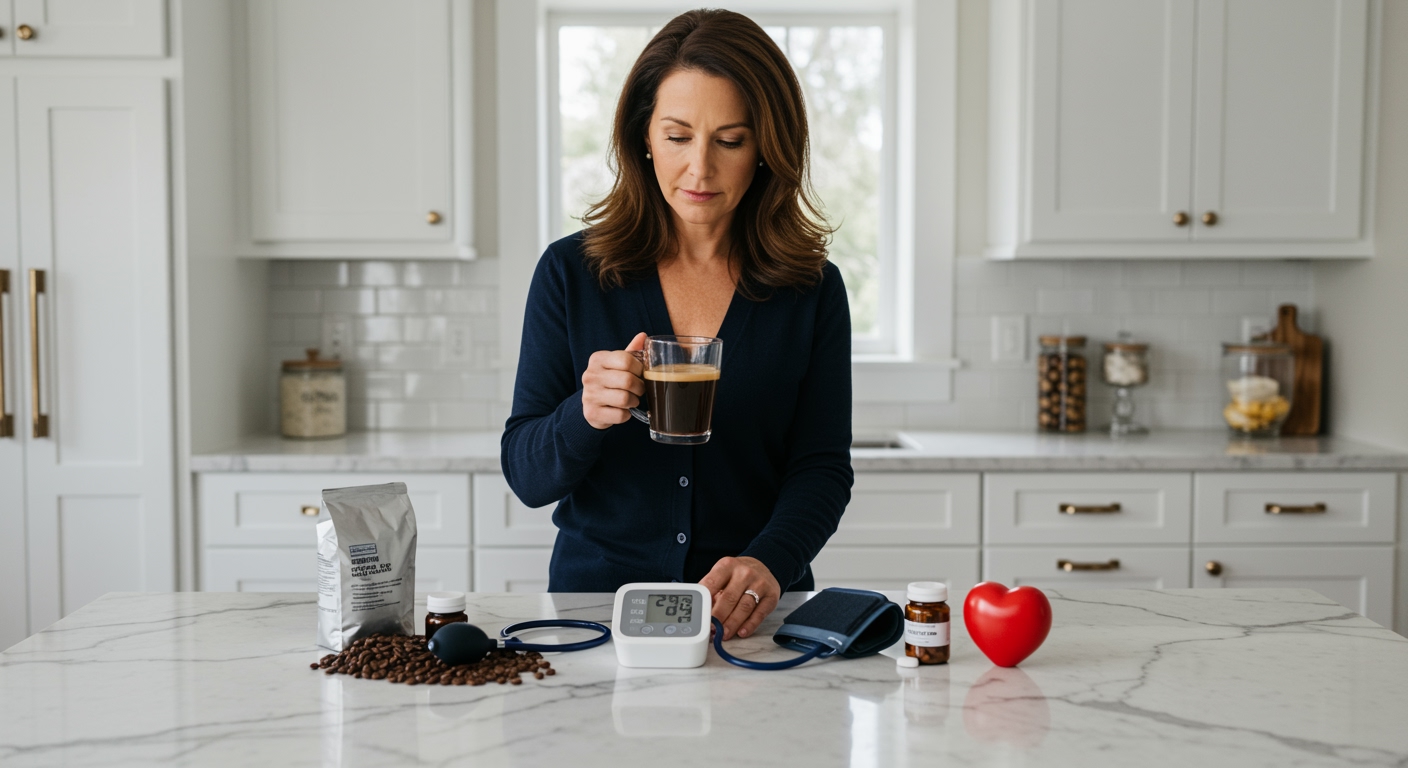✪ Key Takeaway: Caffeine can temporarily raise low blood pressure, but it should not replace proper medical treatment for hypotension.
Introduction
Your morning coffee ritual might be doing more than just waking you up.
If you struggle with low blood pressure, you have probably wondered whether that daily caffeine boost could actually help your condition instead of harm it.
Hi, I am Abdur, your nutrition coach and today I am going to explain how caffeine affects low blood pressure and whether it can be a helpful tool in managing hypotension.
How Does Caffeine Actually Affect Blood Pressure?
Caffeine works by blocking adenosine receptors in your brain and blood vessels.
Adenosine is a chemical that normally helps your blood vessels relax and widen.
When caffeine blocks these receptors, your blood vessels constrict slightly, which increases the pressure needed to pump blood through them.
This mechanism also stimulates your nervous system, causing your heart to beat faster and stronger.
The combination of vessel constriction and increased heart activity typically raises blood pressure by 3-15 mmHg within 30-60 minutes of consumption.
However, this effect is temporary and usually lasts only 3-4 hours in most people.
✪ Fact: Regular caffeine users develop tolerance, making the blood pressure effect less pronounced over time.
Can Caffeine Help With Low Blood Pressure Symptoms?
Many people with low blood pressure experience dizziness, fatigue, and lightheadedness, especially when standing up quickly.
Caffeine can provide temporary relief from these symptoms by raising blood pressure into a more normal range.
The stimulant effect also helps combat the fatigue that often accompanies hypotension.
Research shows that consuming 200-300mg of caffeine can improve cognitive function and alertness in people with low blood pressure.
However, you should understand that caffeine only masks symptoms temporarily rather than addressing the underlying cause of your low blood pressure.
Some people find that strategic caffeine timing helps them manage morning hypotension, which is common in people with this condition.
✪ Pro Tip: Time your caffeine intake 30 minutes before activities that typically trigger low blood pressure symptoms.
What Are The Risks Of Using Caffeine For Low Blood Pressure?
While caffeine might seem like a simple solution, it comes with several potential drawbacks.
Regular caffeine use can lead to dependency, where your body requires increasing amounts to achieve the same effect.
When caffeine wears off, you might experience a rebound effect where your blood pressure drops even lower than before.
Excessive caffeine intake can cause anxiety, jitteriness, and sleep problems, which can worsen the overall quality of life for people with low blood pressure.
Some individuals with certain heart conditions should avoid caffeine entirely, as it can trigger irregular heartbeats.
The temporary nature of caffeine effects means you would need multiple doses throughout the day, increasing the risk of side effects.
✪ Note: Never exceed 400mg of caffeine daily, which equals about 4 cups of regular coffee.
How Much Caffeine Is Safe For Low Blood Pressure?
The optimal caffeine dose for managing low blood pressure varies significantly between individuals.
Most studies suggest that 100-200mg of caffeine provides beneficial effects without excessive side effects.
This amount equals roughly one to two cups of regular coffee or three to four cups of black tea.
People who are caffeine-sensitive should start with smaller amounts, around 50-100mg, to assess their tolerance.
The timing of consumption matters as much as the amount, with morning intake being most beneficial for daily functioning.
You should avoid consuming caffeine late in the day, as it can interfere with sleep quality and recovery.
Always consult with your healthcare provider before using caffeine as a management strategy for low blood pressure.
✪ Pro Tip: Keep a blood pressure log to track how different caffeine amounts affect your readings throughout the day.
What Are Better Long-Term Solutions For Low Blood Pressure?
While caffeine can provide temporary relief, addressing low blood pressure requires a more comprehensive approach.
Increasing your salt intake slightly can help raise blood pressure, but this should be done under medical supervision.
Staying properly hydrated is crucial, as dehydration can worsen hypotension symptoms significantly.
Regular exercise, particularly activities that strengthen your cardiovascular system, can improve blood pressure regulation over time.
Eating smaller, more frequent meals helps prevent the blood pressure drops that often occur after large meals.
Compression stockings can help prevent blood from pooling in your legs, which is especially helpful for people with orthostatic hypotension.
Some people benefit from specific medications prescribed by their doctor to manage chronic low blood pressure effectively.
✪ Fact: Standing up slowly and flexing your calf muscles can help prevent sudden blood pressure drops.
The Bottom Line
Caffeine can temporarily raise low blood pressure and provide symptom relief, but it should not be your primary treatment strategy.
Smart nutrition choices work best when they support your body naturally rather than forcing temporary fixes.
I would love to hear about your experiences with caffeine and blood pressure management, so please share your thoughts or questions in the comments below.
References
At NutritionCrown, we use quality and credible sources to ensure our content is accurate and trustworthy. Below are the sources referenced in creating this article:
- Harvard Health: Coffee and your blood pressure
- Healthline: Coffee and Blood Pressure
- Cleveland Clinic: Caffeine and Blood Pressure
- eMedicineHealth: Is Coffee Good for Low Blood Pressure





